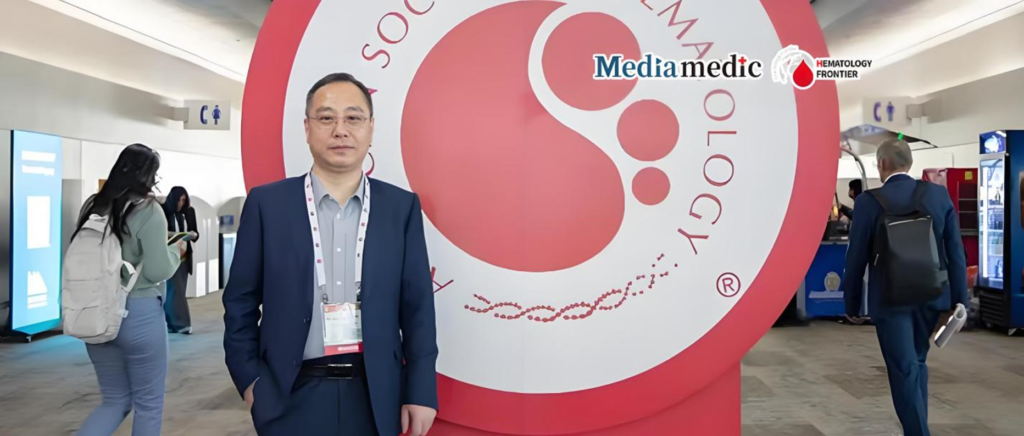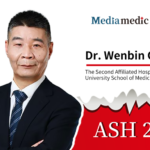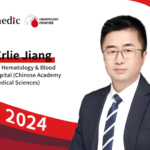
Editor's Note: Acute myeloid leukemia (AML) remains a major clinical challenge due to its high heterogeneity. While CAR-T cell therapy has shown tremendous success in treating various hematologic malignancies, its application in AML is still in its infancy, necessitating further research and exploration. At the 2024 American Society of Hematology (ASH) Annual Meeting, held from December 7–10, Dr. Mingfeng Zhao from Tianjin First Central Hospital presented groundbreaking findings on a novel iCAR-T therapy for AML, offering renewed hope for patients. Hematology Frontier had the privilege of inviting Prof. Zhao to discuss this study and share insights on his team’s future research plans.01. Hematology Frontier: CAR-T therapy has achieved significant success in treating B-cell malignancies but remains challenging for AML. What are the main obstacles in applying CAR-T therapy to AML?
Dr. Mingfeng Zhao: CAR-T therapy has revolutionized the treatment landscape for numerous hematologic malignancies, including lymphomas, multiple myeloma, and acute lymphoblastic leukemia (ALL). However, its application in AML remains nascent, characterized by insufficient preclinical work and unsatisfactory treatment outcomes. Several factors contribute to the challenges in treating AML with CAR-T therapy.
The most significant issue is the lack of an ideal target antigen. Unlike CD19 or BCMA, which are uniformly expressed in other malignancies, AML’s heterogeneity leads to dispersed and inconsistent antigen expression. This substantially hampers the efficacy of CAR-T therapy. Moreover, AML’s tumor microenvironment (TME) differs significantly from that of other hematologic malignancies, potentially restricting the use of CAR-T cells or diminishing their efficacy. Off-target effects further complicate the situation, contributing to limited success in treating AML.
Although AML is the most common type of leukemia, current treatment options—including immunotherapy, targeted therapy, and hematopoietic stem cell transplantation—fail to achieve complete remission for many patients. There is an urgent need for novel therapeutic approaches. Optimizing CAR-T therapy to overcome these challenges is essential to providing better outcomes for AML patients.
02. Hematology Frontier: During this ASH meeting, your oral presentation (Abstract #372) focused on the application of modified dual CLL1-CD15 and CLL1-CD16 iCAR-T therapies in AML treatment. Could you elaborate on the unique mechanisms and advantages of these novel CAR-T therapies?
Dr. Mingfeng Zhao: First, I am honored that our study was selected for an oral presentation at ASH. The significance of this work lies in addressing a major limitation of AML-targeting CAR-T therapy: the adverse effect of severe neutropenia (low neutrophil levels) caused by off-target effects.
In earlier studies, we identified CLL1 as a promising target antigen for AML. When we treated nearly 60 patients with CLL1 CAR-T cells, the complete remission (CR) rate exceeded 70%. However, a critical limitation of this therapy was severe neutropenia. This occurs because CLL1 is also highly expressed on neutrophils, leading to their unintended destruction. Consequently, patients became more susceptible to infections, often resulting in treatment failure.
To address this issue, we developed a novel type of CAR-T cell, termed iCAR-T (inhibitory CAR-T), based on a “logic gate” design. These iCAR-T cells can recognize multiple targets. By identifying an antigen that is highly expressed on neutrophils but minimally or not expressed on tumor cells—such as CD15 or CD16—we could use the logic gate to specifically avoid targeting neutrophils. This selective killing mechanism allows the iCAR-T cells to destroy AML cells expressing CLL1 while sparing neutrophils, thereby reducing the occurrence of neutropenia. Preclinical studies, including in vitro and animal experiments, have demonstrated the excellent safety profile of this approach.
03. Hematology Frontier: What were the main findings of your study regarding the efficacy and safety of CLL1-CD16 iCAR-T in vivo?
Dr. Mingfeng Zhao: As I mentioned earlier, our novel iCAR-T cells effectively target AML cells in vitro while sparing neutrophils. The anti-tumor efficacy of these iCAR-T cells is comparable to that of single-target CLL1 CAR-T cells.
In animal models, the iCAR-T cells demonstrated improved safety and extended survival. Mice treated with iCAR-T experienced fewer side effects and enjoyed longer survival periods. These promising preclinical results provide a solid foundation for clinical application. We are confident that this novel iCAR-T therapy will soon be implemented in clinical settings, offering enhanced treatment efficacy for AML with reduced toxicity and side effects, ultimately improving patient outcomes.
04. Hematology Frontier: Based on your findings, what are your team’s next research steps, and how do you envision the future of CLL1-CD16 iCAR-T in AML treatment?
Dr. Mingfeng Zhao: Our immediate next step is to initiate clinical trials. With approval from the ethics committee, we aim to test the novel CLL1-CD16 iCAR-T therapy in AML patients. Building on the already impressive CR rate of over 70%, this iCAR-T therapy could further reduce the duration of neutropenia and infection rates, significantly increasing the overall success rate of AML treatment.
In addition to this specific therapy, our team is also exploring other logic-gated CAR-T approaches, such as SynNotch and SPLIT designs. These involve different targets and combinations, but all share the same goals: improving therapeutic efficacy and minimizing side effects. We hope to identify one—or even several—optimal CAR-T therapies for clinical use, ultimately benefiting more patients.
Mingfeng Zhao
- Tianjin First Central Hospital Chief of Hematology Leader of the Tianjin Key Discipline of Hematology
- Academic Titles: MD, PhD, and doctoral advisor at Nankai University and Tianjin Medical University Member of the Red Cell Committee of the Chinese Society of Hematology Standing member of the Tianjin Society of Hematology Vice Chair of the Hematology Committee of the Chinese Integrative Medicine Society, Tianjin Branch Standing Member of the National Hematology Committee of the Chinese Medical Doctor Association Vice Chair of the Tianjin Lymphoma Committee of the Chinese Anti-Cancer Association Standing Member of the National Blood Disorders Committee of the Chinese Society of Gerontology and Geriatrics Member of the MDS/MPN Collaboration Group Expert Committee Vice Chair of the Tianjin Blood Diseases Committee of the Tianjin Medical Health Society Vice Chair of the Beijing-Tianjin-Hebei Blood Disease Alliance Recognized as a “First-Level Innovative Talent” under Tianjin’s “131 Talent Program” and named among the inaugural “Tianjin Medical Elites”
Areas of Expertise:
Specializes in the systemic management of hematologic malignancies, CAR-T therapy, and haploidentical hematopoietic stem cell transplantation.
Achievements: Principal investigator for over 10 national and provincial key research projects, including those funded by the National Natural Science Foundation of China. Lead author or corresponding author of 140+ publications, with over 50 SCI-indexed papers in journals such as Blood, JHO, Leukemia, CCR, and Haematologica (total impact factor exceeding 400). Two-time recipient of Tianjin Science and Technology Progress Awards.


